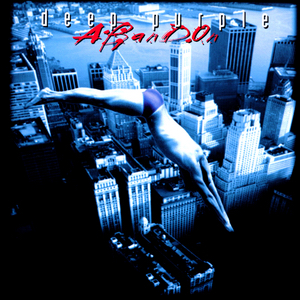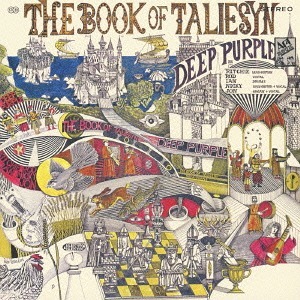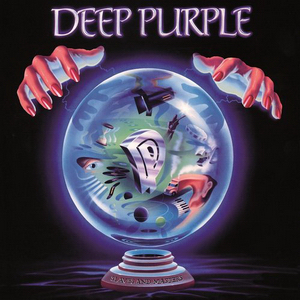See also
| This disambiguation page lists articles associated with the title Deep Purple. If an internal link led you here, you may wish to change the link to point directly to the intended article. |
Deep Purple are an English rock band.
Deep Purple or deep purple may also refer to:
| This disambiguation page lists articles associated with the title Deep Purple. If an internal link led you here, you may wish to change the link to point directly to the intended article. |

Deep Purple are an English rock band formed in Hertford in 1968. The band is considered to be among the pioneers of heavy metal and modern hard rock, although their musical approach changed over the years. Originally formed as a psychedelic rock and progressive rock band, the band shifted to a heavier sound in 1970. Deep Purple, together with Led Zeppelin and Black Sabbath, have been referred to as the "unholy trinity of British hard rock and heavy metal in the early to mid-seventies". They were listed in the 1975 Guinness Book of World Records as "the globe's loudest band" for a 1972 concert at London's Rainbow Theatre and have sold over 100 million copies of their albums worldwide.

Roger David Glover is a British bassist, songwriter, and record producer. He is best known as the bassist for hard rock bands Deep Purple and Rainbow. Glover wrote the guitar riff on "Maybe I'm a Leo". As a member of Deep Purple, Glover was inducted into the Rock and Roll Hall of Fame in April 2016.

Bananas is the 17th studio album by English rock band Deep Purple, released on 9 September 2003 via EMI Records and on 7 October 2003 via Sanctuary Records in the US. It is the first album to feature Don Airey on organ and keyboards, replacing founding member Jon Lord.

Who Do We Think We Are is the seventh studio album by the English hard rock band Deep Purple, released in 1973. It was Deep Purple's last album with singer Ian Gillan and bassist Roger Glover until Perfect Strangers came out in 1984.

Perfect Strangers is the eleventh studio album by the British rock band Deep Purple, released in October 1984. It was the most successful album recorded by the reformed 'Mark II' line-up.

Shades of Deep Purple is the debut studio album by the English rock band Deep Purple, released in July 1968 on Tetragrammaton in the United States and in September 1968 on Parlophone in the United Kingdom. The band, initially called Roundabout, was the idea of former Searchers drummer Chris Curtis, who recruited Jon Lord and Ritchie Blackmore before leaving the project. The Mk. I line-up of the band was completed by vocalist/frontman Rod Evans, along with bassist Nick Simper and drummer Ian Paice, in March 1968.

Abandon is the sixteenth studio album by the British hard rock band Deep Purple, released in the Spring of 1998. It was Deep Purple's second album with Steve Morse on guitar and the last album to feature founding member Jon Lord prior to his departure in 2002.

"Hush" is a song written by American composer and musician Joe South, for recording artist Billy Joe Royal, whose single peaked at number 52 on the Billboard Hot 100 on 28 October – 11 November 1967, and No. 45 in Canada. South himself recorded the song in 1968, and included it on his second album, Games People Play.

Deep Purple, also referred to as Deep Purple III, is the third studio album by the English rock band Deep Purple, released in June 1969 on Tetragrammaton Records in the United States and only in September 1969 on Harvest Records in the United Kingdom. Its release was preceded by the single "Emmaretta" and by a long tour in the UK, whose dates were interspersed between the album's recording sessions.

The Book of Taliesyn is the second studio album by the English rock band Deep Purple, recorded only three months after Shades of Deep Purple and released by Tetragrammaton Records in October 1968, just before their first US tour. The name for the album was taken from the 14th-century Book of Taliesin.

Slaves and Masters is the thirteenth studio album by the British rock band Deep Purple, and was released on 5 October 1990. This is the only Deep Purple album to feature former Rainbow lead vocalist Joe Lynn Turner, who had joined the previous year after the firing of Ian Gillan. Before hiring Turner, the band had considered singer Jimi Jamison of Survivor, but other obligations made him unavailable.

Made in Europe is a live album released by Deep Purple, recorded on the final dates in April 1975 before Ritchie Blackmore left Deep Purple. It was released in October 1976, after the group had broken up.

Scandinavian Nights is a double live album by the British hard rock band Deep Purple.It was recorded in the Stockholm Konserthuset on 12 November 1970.

"Fireball" is a song by the English rock band Deep Purple, from the album of the same name. It was also released as the band's second single of 1971, and peaked at No. 15 on the UK Singles Chart. It is one of several songs based on Ian Gillan's real life experiences: "She was a complete mystery to me. This is another tale of unrequited love", he explained.
"Mandrake Root" is a song by Deep Purple that is featured on their debut album Shades of Deep Purple. The title is in reference to the mandrake plant, but is also the name of a pre-Purple band that Blackmore was trying to form in Germany when he got the call from Deep Purple's original management.

"Kentucky Woman" is a 1967 song written and originally recorded by Neil Diamond. Another well-known version is the 1968 recording by Deep Purple.

"Strange Kind of Woman" is a song by British rock band Deep Purple that was originally released as a follow-up single after "Black Night" in early 1971. The song also became a hit, peaking at No. 8 on the UK chart. The 1996 remix by Roger Glover later appeared on the re-release of the band's 1971 album Fireball, while the original version can be found on various Deep Purple compilations. Although not part of the Fireball recording sessions, "Strange Kind of Woman" was included on the US and Canadian editions of the album, in lieu of the track "Demon's Eye" on the UK edition.

"Burn" is a song by British rock band Deep Purple. Its riff is similar to the 1924 song "Fascinating Rhythm". It was released on the album of the same name in 1974, and was the first song by the Mark III lineup. The song remained the band's concert opener for the next two years, taking over from "Highway Star". It opened Deep Purple's set on the California Jam two months after its release, on 6 April 1974.

Deep Purple in Rock is the fourth studio album by English rock band Deep Purple, released in June 1970. It was the first studio album recorded by the Mark II line-up of Ian Gillan, Ritchie Blackmore, Roger Glover, Jon Lord and Ian Paice.
"Soldier of Fortune" is a blues rock ballad written by Ritchie Blackmore and David Coverdale and originally released on Deep Purple's 1974 album Stormbringer. Though Deep Purple has never released the song as a single and it has never placed on the record charts, it has developed a cult following over the years, and cover versions have been released by Whitesnake, Opeth, and Black Majesty, and has been covered in concert by Blackmore's Night.